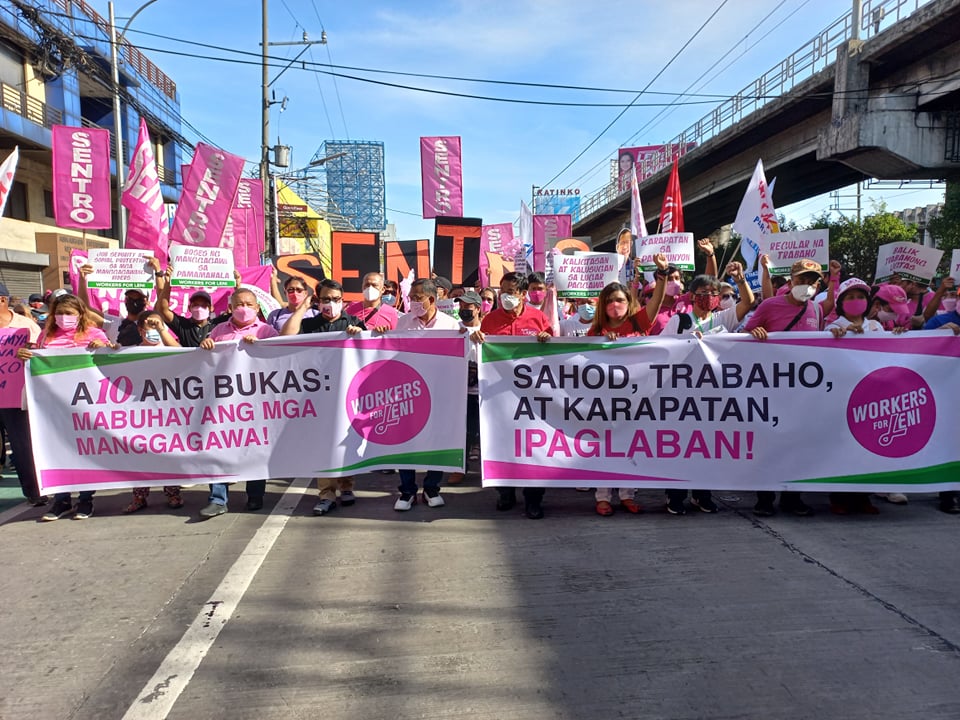Workers Brave Attacks, Forge Unity to Fight for Labor Agenda

This year’s International Labor Day is more historical than ever for Filipino workers as it marks the last week before the most important National Elections in the Philippines. The Filipino working class has a lot at stake in these coming elections, starting to hope again in the efforts to recover from dire health, economic and human rights crises.
The past six years under the Duterte regime was a nightmare it did not failed but plunged the workers into deeper hardships – skyrocketing prices of transportation & basic commodities amid soaring unemployment, frozen low wages, flexibilization and unprecedented attacks against unionists and labor rights defenders.
Unemployment in March 2022, despite relaxation of quarantine restrictions, is pegged by the government at 6.4%, equivalent to almost 3 million Filipinos. In reality, this seems low considering the impacts of the pandemic on MSMEs that employ most Filpinos. However, SWS’s recent study (December 2021) indicates that unemployment is at 24.7%. It can be recalled that SWS also reported the highest unemployment rate of 45.5% in July 2020. It is also important to note that before the Duterte administration took over, joblessness was only at 2.49% during the same period.
The Duterte regime miserably failed to uplift the lives of the workers. Contractualization —Duterte’s campaign promise, continues as according to World Bank, 75% of PH workforce do not see possibility to be gainfully employed. Contractual workers continue to receive much lower wages and poorer working conditions.
Meanwhile, wage increase was the lowest in 35 years under this administration. Amidst the price increases and 14 time oil price hike, workers continue to demand for wage increase and national minimum wage but Duterte continues to ignore the clamor, clearly favoring big businesses.
The Center for Trade Union and Human Rights (CTUHR) highlights how workers right to freedom of association, was systemically trampled upon by Duterte’s administration. Using the Anti-Terrorism Law and Executive Order No. 70, Pres. Duterte comprehensively violated workers’ rights.
The Center also highlighted how Duterte used the NTF-ELCAC and JIPCO (AIPP) to brazenly attack workers and unionists through red-tagging, vilification, harassment and intimidation, raids, filing of trumped-up charges, arrests and killing of farmworkers, labor rights defenders and organizers and unionists. Up to the present, NTF-ELCAC continues to hound unionists like tag them as terrorists and force them to disaffiliate from their federations or stop their union activities.
CTUHR noted that the Philippines consistently landed on the ITUC’s 10 Most Dangerous countries for workers in the past 5 years. The Center attributes this to Duterte’s bloody record of 56 killings in the labor sector. 31 unionists and labor organizers remain locked up in jails due to trumped up charges and planted evidence.
It is election time and workers make their voice known, “We have witnessed how workers are– actively campaigning against Marcos-Duterte and pushing for their demands to candidates who they believe will best serve their interests. We see hope renewed among workers as they root for the opposition candidates,” CTUHR said.
Workers continue to face, attacks.Even during the campaign period, But they maintained their resolve and forged unity (in its real essence and not the kind that the Unithieves always speak of) with other sectors to campaign for the labor agenda and genuine change. Alliances such as the Labor Vote, Manggagawa Kontra Daya at Karahasan and Workers for Leni were formed in the duration of the campaign period.
“The Filipino workers and the people deserve a better government. One that will truly address their clamor for decent work, national minimum wage, ending of contractualization, safe workplaces and respect to their right to organization,” CTUHR ended.
